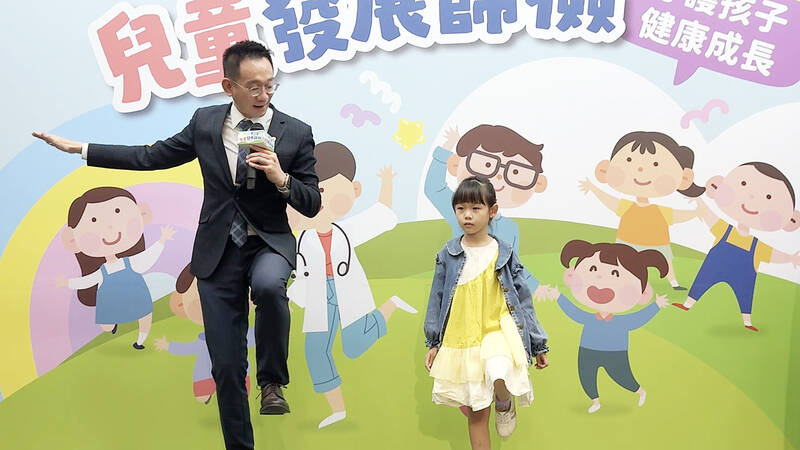More than 400,000 child development screenings were performed in the past year, discovering more than 25,000 suspected developmental delays, since the Health Promotion Administration (HPA) launched the screening service for children younger than seven on July 1 last year, the agency said yesterday.
A four-year-old girl nicknamed Hsiao-an (小安) appeared to be growing normally, but her mother observed that she often had mood swings and would easily lose her temper, such as bursting out crying when playing with blocks, scribble frantically when trying to draw and often fall down when walking.
Pediatrician Mai Jian-fang (麥建方) said after receiving a child development screening, Hsiao-an was evaluated to have normal language and social development, but struggled with certain behaviors such as hopping on one leg, cutting paper with scissors and drawing, and was suspected to have fine motor skill delays.

Photo: Lin Chih-yi, Taipei Times
After Hsiao-an was referred to an interdisciplinary assessment center for child development, she was confirmed to have hand-eye coordination issues because she had a significant difference in eyesight between her two eyes — up to four diopters, he said.
The girl’s motor skills and mood swings improved rapidly after she was proscribed corrective glasses and rehabilitation, he added.
The service offers six screening sessions per child before they reach the age of seven to assess gross motor skills, fine motor skills, language development and social development.
As of the end of last month, a total of 402,594 screenings were conducted in the past year, finding more than 25,000 suspected developmental delay cases — or 6.3 percent of the total — and also about 63,000 cases that needed follow-up and healthcare instructions, HPA Director-General Wu Chao-chun (吳昭軍) said.
The screenings were conducted by more than 2,600 pediatricians, family doctors and doctors in the Holistic Physicians for Young Children program at more than 1,200 healthcare facilities across the nation, the HPA said.
HPA official Lin Yu-hsuan (林宇旋) said most of the suspected development delay cases struggled in language and cognitive skills, accounting for 75.6 percent, followed by social development at 29 percent, fine motor skills at 28.8 percent, and gross motor skills at 17.3 percent.
Doctors refer them to an interdisciplinary assessment center for child development, with the number of centers increasing from 52 in 2022 to 88 this year, including 17 designated key hospitals that are not allowed to reject referred cases, Wu said.
The centers are required to let the referred cases book an assessment appointment within 30 days and provide a comprehensive assessment report to the HPA within 45 days, he said, adding that the compliance rate was more than 90 percent last year and hopefully it would reach 100 percent this year.
Mackay Memorial Hospital Child Intervention and Developmental Assessment Center director Chen Hui-ju (陳慧如) said sometimes the assessment of development delay is very complicated, demanding professional knowledge and time.
As many centers are established in hospitals, and many are facing a shortage of healthcare workers, she hopes the government can provide more resources to help retain workers and ensure high-quality assessments, she said.
The HPA recommends three steps for parents to follow — first, refer to the Children’s Health Handbook (兒童健康手冊) and make daily observations of their child’s development; second, use the six screening services according to the recommended schedule; and third, if the child is suspected to have developmental delays, get an assessment at interdisciplinary

The manufacture of the remaining 28 M1A2T Abrams tanks Taiwan purchased from the US has recently been completed, and they are expected to be delivered within the next one to two months, a source said yesterday. The Ministry of National Defense is arranging cargo ships to transport the tanks to Taiwan as soon as possible, said the source, who is familiar with the matter. The estimated arrival time ranges from late this month to early next month, the source said. The 28 Abrams tanks make up the third and final batch of a total of 108 tanks, valued at about NT$40.5 billion

Two Taiwanese prosecutors were questioned by Chinese security personnel at their hotel during a trip to China’s Henan Province this month, the Mainland Affairs Council (MAC) said yesterday. The officers had personal information on the prosecutors, including “when they were assigned to their posts, their work locations and job titles,” MAC Deputy Minister and spokesman Liang Wen-chieh (梁文傑) said. On top of asking about their agencies and positions, the officers also questioned the prosecutors about the Cross-Strait Joint Crime-Fighting and Judicial Mutual Assistance Agreement, a pact that serves as the framework for Taiwan-China cooperation on combating crime and providing judicial assistance, Liang

A group from the Taiwanese Designers in Australia association yesterday represented Taiwan at the Midsumma Pride March in Melbourne. The march, held in the St. Kilda suburb, is the city’s largest LGBTQIA+ parade and the flagship event of the annual Midsumma Festival. It attracted more than 45,000 spectators who supported the 400 groups and 10,000 marchers that participated this year, the association said. Taiwanese Designers said they organized a team to march for Taiwan this year, joining politicians, government agencies, professionals and community organizations in showing support for LGBTQIA+ people and diverse communities. As the first country in Asia to legalize same-sex

MOTIVES QUESTIONED The PLA considers Xi’s policies toward Taiwan to be driven by personal considerations rather than military assessment, the Epoch Times reports Chinese President Xi Jinping’s (習近平) latest purge of the Chinese People’s Liberation Army (PLA) leadership might have been prompted by the military’s opposition to plans of invading Taiwan, the Epoch Times said. The Chinese military opposes waging war against Taiwan by a large consensus, putting it at odds with Xi’s vision, the Falun Gong-affiliated daily said in a report on Thursday, citing anonymous sources with insight into the PLA’s inner workings. The opposition is not the opinion of a few generals, but a widely shared view among the PLA cadre, the Epoch Times cited them as saying. “Chinese forces know full well that